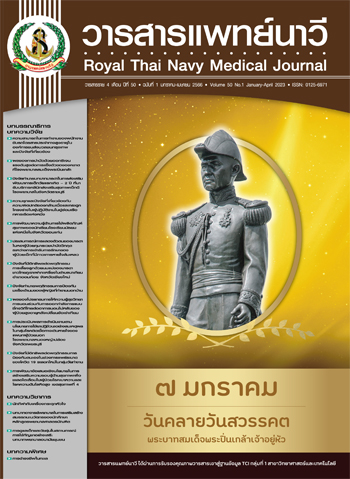The Effects of a Sleep Hygiene Education Program Combined with Thai Style Qigong Exercise on Insomnia among Older Adults after Knee Arthroplasty
Main Article Content
Abstract
This quasi-experimental research aimed to examine the effects of a sleep hygiene education program combined with Thai style qigong exercise on insomnia among older adults after knee arthroplasty. The sample consisted of 40 elderly people over the age of 60 who were treated in an orthopedic examination room, outpatient department, Lerdsin hospital from 1 and less than 3 months following knee arthroplasty. They were selected by purposive sampling. The subjects were equally divided into a control group and an experimental group. They were matched in terms of age, sex and insomnia level. The control group received conventional nursing care while the experimental group received the sleep hygiene education program combined with Thai style qigong exercise. The instrument used to collect data was the Insomnia Severity Index. The statistical techniques used in data analysis were percentage, mean, and t-test.
The results revealed that after participating the program, the experimental group had significantly lower insomnia than before joining the program (p < .05). The experimental group had significantly lower insomnia than that in the control group (p < .05). The results of this research supported that a sleep hygiene education program combined with Thai style qigong exercise can effectively reduce insomnia in elderly patients after knee replacement.
Article Details

This work is licensed under a Creative Commons Attribution-NonCommercial-NoDerivatives 4.0 International License.
References
Charoenchonvanich K. Osteoarthritis of the knee. In: Charoenchonvanich K, editor. Reconstructive surgery of the osteoarthritic knee. Bangkok: Siriraj Books; 2016. p. 3-9. (in Thai).
Tengpanichkul P, Chuetaleng T, Thongteratham N. Nursing care after knee arthroplasty: orthopedic nursing. Bangkok: Faculty of Nursing, Textbook Project Mahidol University; 2006. (in Thai).
Kennedy DM, Hanna SE, Stratford PW, Wessel J, Gollish JD. Preoperative function and gender predict pattern of functional recovery after hip and knee arthroplasty. J Arthroplasty 2006;21(4):559-66.
Kamwarat P, Sasat S. Factors related to activities limitation in olders persons after total knee arthroplasty. Royal Thai Navy Medical Journal 2019;46(3):684-99. (in Thai).
Long G, Suqin S, Hu Z, Yan Z, Huixin Y, Tianwang L, et al Analysis of patients' sleep disorder after total knee arthroplasty-a retrospective study. Journal of Orthopaedic Science 2019;24(1):116-20.
National Institutes of Health. National Institutes of Health state of the science conference statement on manifestations and management of chronic insomnia in adults, 2005 June 13-15. Sleep 2005;28(9):1049-57.
Cremeans-Smith JK, Millington K, Sledjeski E, Greene K, Delahanty DL. Sleep disruptions mediate the relationship between early postoperative pain and later functioning following total knee replacement surgery. Journal of Behavioral Medicine 2006;29(2):215-22.
Waragulnukroh W, Payakkaraung S, Achawakulthep W, Bunprakong L. Pain experience in patients undergoing total knee replacement. Journal of Nursing Science 2011;29(3):74-82. (in Thai).
Sateia MJ. International classification of sleep disorders-third edition: highlights and modifications. Chest 2014;146(5):1387-94.
Glovinsky P, Spielman A. The insomnia answer: a personalized program for identifying and overcoming the three types of insomnia. New York: Perigee Books; 2006.
Bliwise DL, King AC, Harris RB, Haskell WL. Prevalence of self-reported poor sleep in a healthy population aged 50-65. Social Science & Medicine 1992;34(1):49-55.
Liamsombat S. Sleep medicine in the elderly. In: Punjapornpol K, editors. Basic sleep medicine for doctors nurses students and healthcare professionals. Bangkok: Sleep Society of Thailand; 2017. p. 183-93. (in Thai).
Grosu I, Lavand'homme P, Thienpont E. Pain after knee arthroplasty: an unresolved issue. Knee Surg Sports Traumatol Arthrosc 2014;22(8):1744-58.
Judd DL, Eckhoff DG, Stevens-Lapsley JE. Muscle strength loss in the lower limb after total knee arthroplasty. Am J Phys Med Rehabil 2012;91(3):220-6.
Boonprakob T, Sasat S. Selected factors related to postoperative recovery in older person with total knee arthroplasty. Royal Thai Navy Medical Journal 2018;46(2):355-68. (in Thai).
Cooper J. Anxiety vs insomnia: sleep disorders. [Internet]. [cited 2021 July 14]. Available from: https://www.webmd.com/sleep-disorders/anxiety-vs- insomnia #091e9c5e821f2b2a-1-2.
Dahlen L, Zimmerman L, Barron C. Pain perception and its relation to functional status post total knee arthroplasty: a pilot study. Orthopaedic Nursing 2006;25(4):264-70.
Elmoneem H, Fouad A. The effect of a sleep hygiene program on older adults. Journal of Nursing and Health Science 2020;(6):40-51.
Hoytong S. The effect of a sleep promotion program applying self-efficacy theory for community dwelling insomnia older adults. [Master’s Thesis, Faculty of Nursing]. Burapha University; 2012. (in Thai).
Skoglund L, Josephson M, Wahlstedt K, Lampa E, Norback D. Qigong training and effects on stress, neck-shoulder pain and life quality in a computerised office environment. Complement Ther Clin Pract 2011;17(1):54-7.
Chan AWK, Yu DSF, Choi KC. Effects of tai chi qigong on psychosocial well-being among hidden elderly, using elderly neighborhood volunteer approach: a pilot randomized controlled trial. Clin Interv Aging 2017;12(5):85-96.
Irish LA, Kline CE, Gunn HE, Buysse DJ, Hall MH. The role of sleep hygiene in promoting public health: a review of empirical evidence. Sleep Med Rev 2015;22:23-36.
Thanasil S. Health Thai style qigong. Bangkok: Preeone; 2014. (in Thai).
Polit DF, Beck CT. Nursing research: principles and methods. 7th ed. Philadelphia; Lippincott Williams & Wilkins; 2004.
Morin CM. Insomnia: psychological assessment and management. New York: Guilford Press; 1993.
Kaewphang P. Relationships between selected factors and insomnia in adult cancer patients. [Master’s Thesis, Faculty of Nursing]. Chulalongkorn University; 2004. (in Thai).
Hemboot C. The effect of sleep hygiene modification program on insomnia in breast cancer patients receiving chemotherapy. [Master’s Thesis, Faculty of Nursing]. Chulalongkorn University; 2020. (in Thai).
Low SLK, Cheema BS, Tan HY, Birling Y, Zhu X. The feasibility and effects of Qigong intervention (mind-body exercise) in cancer patients with insomnia: a pilot qualitative study. Integrative Cancer Therapies 2020;19:1-12.


